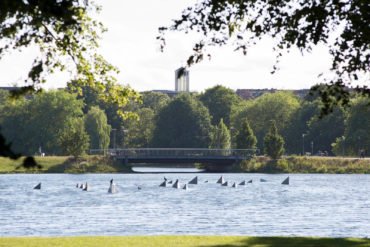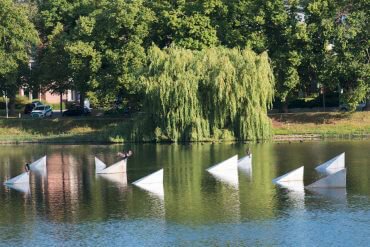Artist
Ulrich Behl
Ulrich Behl was born on 22 September 1939 in Arnswalde (Pomerania). From 1961 to 1964, he studied at the teacher training college in Alfeld (Leine) under Kurt Schwertfeger and others. From 1965 he focussed on hand drawing as an artistic medium, and from 1967 on printmaking with a focus on lithography and the phenomenon of light. From 1967 to 1968 he studied at the Werkkunstschule in Hanover and from 1971 to 1975 art history at the Christian-Albrechts University in Kiel. When he turned his attention to the progression of light on geometric structures in 1977, he began to focus on Concrete Art. Since 1966, the active draughtsman, graphic artist and object artist has been represented throughout Germany with solo exhibitions. His works are part of many public collections as well as art in public spaces in Germany. He became a member of the Deutscher Künstlerbund in 1993. In 1995 he took part in the Venice Biennale and was guest of honour at the Villa Massimo in Rome in 1997. In 2002, he founded the Kiel studio community neunziggrad-kiel. In 2016 he was awarded the City of Kiel's Culture and Science Prize. Ulrich Behl lived and worked in Kiel, where he died on 1 September 2021.

The water surface of the Kleiner Kiel not only provides the stage for an installation by Kiel artist Ulrich Behl, but is also an important part of its effect. This is because 24 (originally 27) small aluminium bodies float in the water during the summer months and are moved by the wind and waves. Due to their constantly changing positions and the play of light and shadow, they appear to be part of the water and the surrounding nature. Depending on the direction of view and the weather, they also incorporate the reflective surface of the water and the seabirds. The floating bodies follow the formal language of mathematics: each element is constructed as a tetrahedron and shows three triangular surfaces of different sizes above the surface of the water. The strict clarity of each individual body dissolves in the random arrangement of all the elements through groupings, optical superimpositions and the changing orientation to create ever new images. From a distance, the installation is reminiscent of a group of sailing ships on the Kiel Fjord, bringing the maritime flair so typical of Kiel to the centre of the city.
